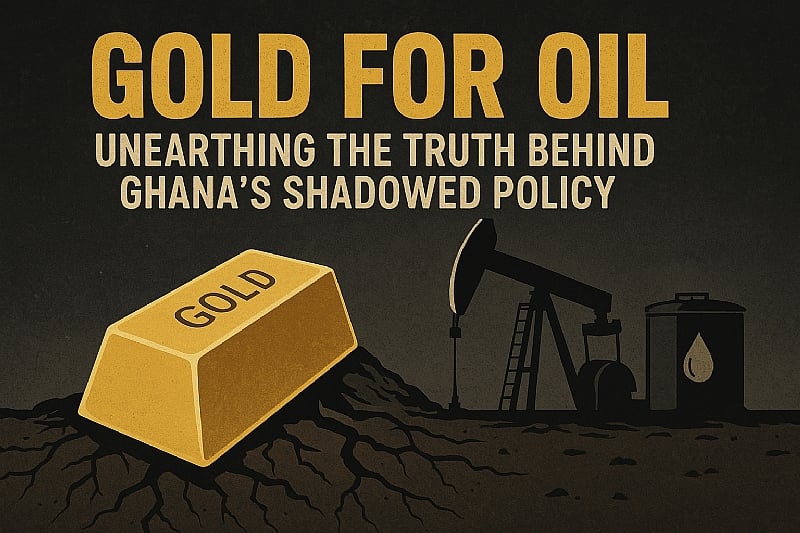🪙🛢️ Background: A National Pivot
In the economic turbulence of late 2022, Ghana’s leadership — under President Akufo-Addo, Vice President Bawumia, and Finance Minister Ken Ofori-Atta — introduced a resource-backed solution to Ghana’s pressing economic woes. The idea was simple in its ambition: trade domestically mined gold for refined petroleum products.
This was framed as a strategic move to:
Reduce the demand for scarce U.S. dollars
Stabilize the cedi
Lower fuel prices for the Ghanaian public
The nation responded with guarded optimism. It was a policy that leaned on local strength — Ghana’s gold reserves — rather than borrowed hope.
But as the policy unfolded, transparency waned, and the public found itself navigating a cloud of ambiguity.
🌑 Beneath the Surface: What Wasn’t Said
The initiative, which came to be known publicly as “Gold for Oil,” was never tabled before Parliament. There was no policy white paper. No legal framework. No formal debate.
Institutions that would typically weigh in — the Ghana Chamber of Mines, the Public Interest and Accountability Committee (PIAC), civil society watchdogs — were either sidelined or left in the dark. Public reporting by the Bank of Ghana and the Precious Minerals Marketing Company (PMMC) offered technical data about gold exports, but refrained from naming counterparties or contractual terms.
The execution, it seemed, lived primarily within the corridors of executive influence — with Vice President Bawumia introducing the concept, and energy sector briefings offering scattered confirmation that oil shipments had indeed arrived from sources such as the United Arab Emirates.
However, the civic pathway — the one paved with oversight, public scrutiny, and policy coherence — was missing.
🤫 The Disappearing Policy
By mid-2023, oil deliveries were confirmed by the National Petroleum Authority. Citizens saw fuel at the pumps. Yet documents remained scarce.
Then came the rhetorical pivot: in July 2025, Finance Minister Dr. Cassiel Ato Forson declared that the “Gold for Oil” program had never existed.
For many Ghanaians, this felt like a rewriting of history. If gold had been exported and oil delivered, what exactly were we participating in? Was it a barter? A forex swap? A procurement channel under a new name? Or was it a policy that had unraveled quietly in the shadows?
The minister’s statement left more questions than answers — especially given prior government claims, public confirmations, and the tangible delivery of fuel.
⚠️ Seeds of Civic Suspicion
The lack of transparency now feeds a growing civic concern. If national gold was exchanged for foreign oil:
Was the gold fairly valued?
Was the oil competitively sourced?
Were middlemen involved — and if so, who profited?
What were the terms, and who negotiated them?
Without audit trails, procurement disclosures, or financial accountability, the public cannot know whether malfeasance occurred — but the absence of transparency itself challenges the credibility of governance.
🗣️ Civic Call to Action
This moment calls for more than explanation. It calls for restoration.
Ghanaians and the international community must advocate for:
📜 Public release of all documents linked to the initiative
🧾 Independent audit of gold exports and oil imports under this framework
🛡️ Legislative reforms to ensure future resource-backed programs follow due process
📚 Public education on barter systems, resource management, and accountability mechanisms
🇬🇭“Gold, Truth, and Trust.” Let’s transform confusion into clarity, opacity into openness, and civic anxiety into civic action.
Retired Senior Citizen
Teshie-Nungua
[email protected]


